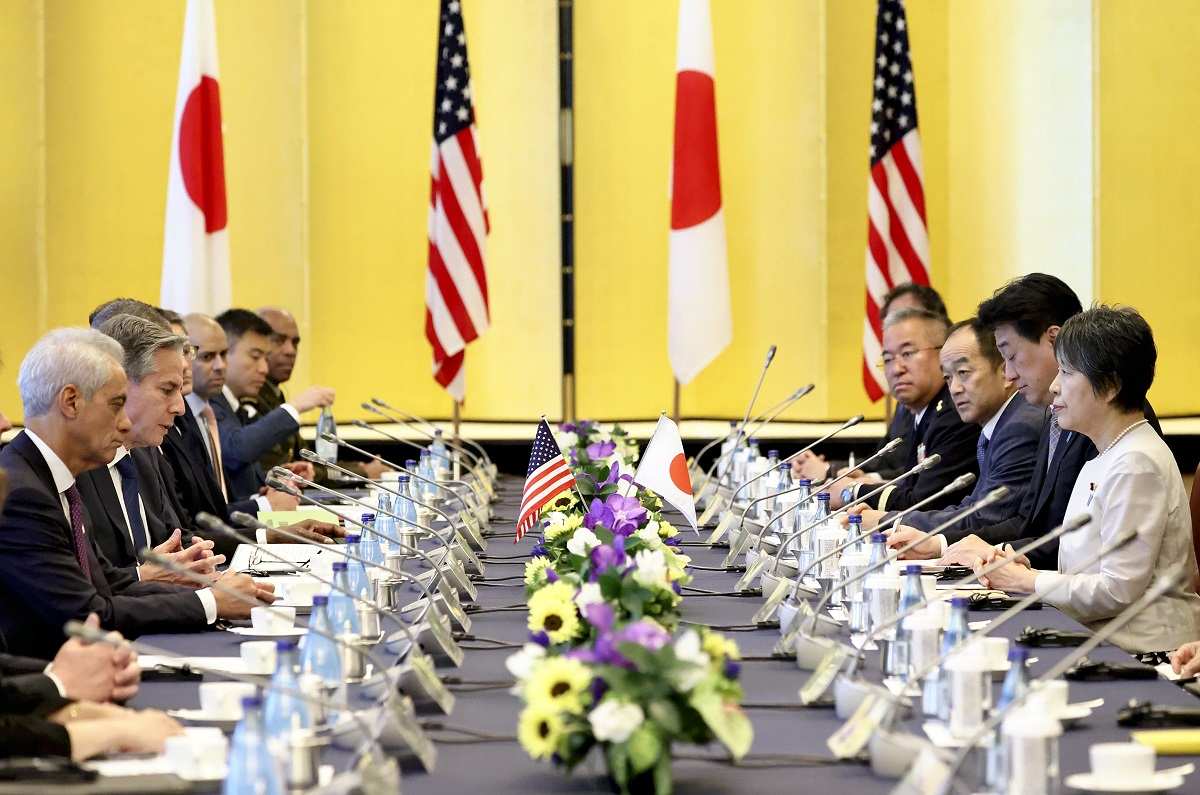U.S. to Reinforce Nuclear Umbrella Over Japan; Agreed on at First Talks by Ministers on Extended Deterrence

Foreign Minister Yoko Kamikawa, right, Defense Minister Minoru Kihara, second from right, and U.S. Secretary of State Antony Blinken, second from left, are seen at the start of a meeting on extended deterrence in Minato Ward, Tokyo, on Sunday.
1:00 JST, July 30, 2024
The administration of U.S. President Joe Biden made clear it intends to reinforce its nuclear umbrella over Japan at the Japan-U.S. Extended Deterrence Dialogue on Sunday in Tokyo, which was held alongside two-plus-two security talks by the countries’ defense and foreign ministers.
In response to the growing nuclear threat from Russia, China and North Korea, the Biden administration is shelving nuclear disarmament and even considering boosting its nuclear capabilities.
At the beginning of the first ministerial meeting between Japan and the United States on extended deterrence, U.S. Defense Secretary Lloyd Austin expressed concerns over growing nuclear threats in East Asia.
“The PRC [China], Russia and North Korea continue to threaten global security with their increasing emphasis on nuclear capabilities, so our extended deterrence relationship is more important than ever,” he said.
The last remaining nuclear arms control agreement between the United States and Russia is now defunct, as Russia announced it would suspend its participation in the New START Treaty in 2023 after invading Ukraine.
The United States has also called on China, which is becoming a “nuclear superpower,” to hold talks on nuclear arms control, but it has not responded. Neither has the Biden administration made any progress on dialogue with North Korea about nuclear and missile issues.
Biden originally advocated for nuclear disarmament and a reduced role for nuclear weapons. Before taking office, he had called for a no-first-use policy, meaning the United States would not use nuclear weapons unless the enemy used them first.
However, after assuming office, Biden shifted to a pragmatic approach. In the Nuclear Posture Review announced in 2022, he decided not to declare a no-first-use policy in the face of fierce opposition from Japan, South Korea and members of the North Atlantic Treaty Organization.
Pranay Vaddi, a senior director at the U.S. National Security Council, said during a speech in June that Russia, China and North Korea “are all expanding and diversifying their nuclear arsenals at a breakneck pace.” He added, “Absent a change in the trajectory of adversary arsenals, we may reach a point in the coming years where an increase from current deployed numbers is required.”
Republican former President Donald Trump also called for an expanded role for nuclear deterrence during his presidency, so the emphasis on such deterrence is expected to continue regardless of the outcome of the U.S. presidential election in November.
A former senior Pentagon official pointed out that both Democratic and Republican administrations have invested in nuclear forces, responding to the nuclear policies of adversarial countries, so that the differences between the two parties have almost disappeared.
"Politics" POPULAR ARTICLE
JN ACCESS RANKING



